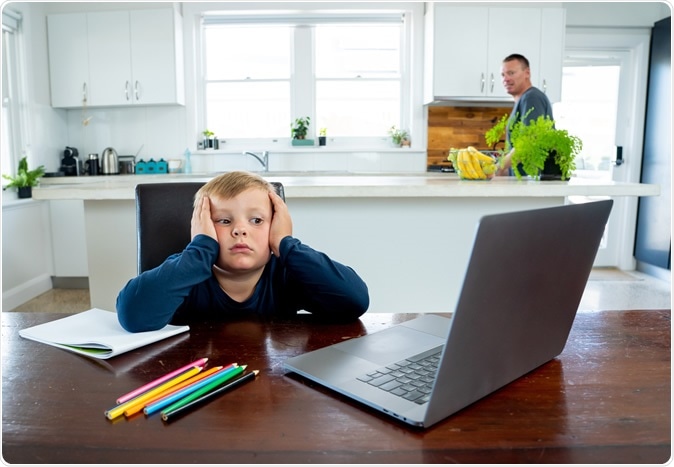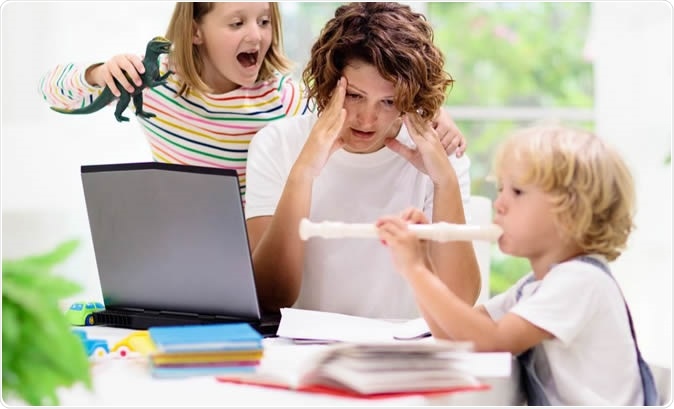As the world grapples with the coronavirus pandemic, lockdown and home-schooling have become a monumental challenge for parents across the globe. Now, a new report shows that parents are most stressed about work followed by worries over their children's wellbeing and education while in lockdown.
The report is based on 5,000 responses to the Co-SPACE (Covid-19 Supporting Parents, Adolescents, and Children in Epidemics) survey led by experts at the University of Oxford.
The study asks questions that relate to family life and relationships, overall health and wellbeing, parenting, psychological symptoms, and how people are coping during the COVID-19 pandemic.
The team of researchers from the University of Oxford studied the responses to provide valuable information on how the parents are keeping up with the current situation.

Image Credit: Sam Wordley / Shutterstock
What the study was about
The Co-SPACE project helps track the mental health of school-aged children and young people, from 4 to 15 years old, throughout the coronavirus pandemic. The report provides cross-sectional data from about 5,000 parents or carers who have completed the survey between March 3 and April 29. The parents completed an online survey every month throughout the crisis.
The questions in the survey involve the most pressing concerns for parents during the pandemic, including their work situation and what are their worries.
"Anecdotal reports suggest that many families and students are struggling with the restrictions imposed by Covid-19, and while general mental health supports are available, there is a distinct lack of information about what type of supports could be most effective in the context of Covid-19," Dr. Jennifer McMahon, lecturer in Psychology of Education, said.
The study findings
The team has found that the most frequent source of stress while in lockdown was work-related, followed by the parents' concerns and worries about the welfare and wellbeing of their children, including the effects of school closures.
Further, nearly half of the parents and carers thought their child was concerned about family and friends contracting the virus, and about a third of them said their child was worried about missing school. Parents also reported the added stress they experience if they work outside the home.

Image Credit: FamVeld / Shutterstock
The families with children who have special needs and neurodevelopmental disorders, they experience higher levels of stress in all aspects. Moreover, about 80 percent of the families who received support from social services said it had been postponed or stopped during the pandemic. With the current situation and no social services support, the families grapple with many challenges.
"This study is so important to understand the experiences of families currently and how this crisis is impacting on them, but also so we can know how best to support families going forward. Our results are showing some hotspots of concern, particularly for parents of children with special education needs and neurodevelopmental disorders. These parents report increased stress across all areas, including managing their children's behavior, they also express a desire for personalized support from professionals," Professor Cathy Creswell, Departments of Psychiatry and Experimental Psychology, University of Oxford, said.
The other findings of the study reveal that while child behavior is rarely a stressor for parents, it is a usual stressor for parents of children with special education needs.
The survey revealed that parents want support around their children's emotional wellbeing, education, coming out of social isolation. All these factors worry parents, which is normal amid the coronavirus crisis.
Though these are results of the preliminary survey, the Co-SPACE researchers urge parents or carers to complete the online questionnaire monthly until social distancing measures are lifted. The survey, which takes about 15 to 20 minutes, will gauge the effects of the coronavirus to family life, relationships, overall health and wellbeing, psychological symptoms, parenting, and how they cope with the pandemic.
COVID-19 situation
As the world combats the novel coronavirus, the number of confirmed cases continues to rise. The total number of cases has reached 4.17 million, while more than 285,000 people have died. The United States remains on the top spot, with the highest number of cases, reaching 1.347 million and over 80,000 deaths.
Spain follows the U.S. with 227,436 reported cases. The United Kingdom 224,332 cases, followed by Russia with over 221,344 cases, Italy with 219,814 cases, France with 177,547 cases, and Germany with 172,576 cases.